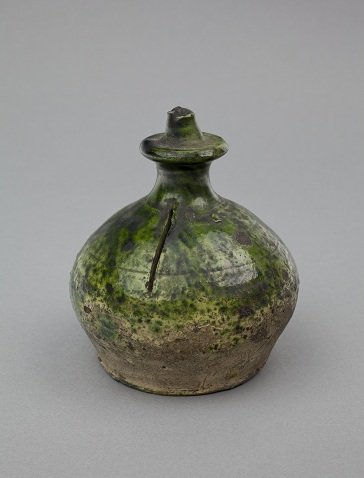This insight into Shakespeare’s world comes from Stephanie Appleton who is a Doctoral Researcher in the History Department at Birmingham

My object this week will be instantly recognisable to many of you: its large, bulbous body, tapering top with distinctive ‘knob’ detail, along with the slit in its side, indicate its use as a money box. This particular example, a ceramic southern borderware pot with a green glaze, dates from between 1550 – 1650, and can be seen on display as part of the exhibition leading to Shakespeare’s Birthplace.
One of the distinctive features of this form of money box is the fact that it is entirely sealed: there is no opening which would allow for the removal of the money stored within. In order to retrieve the contents, the jar has to be smashed. And this peculiarity of its function points to its use, which is connected with Shakespeare and his life in the metropolis: boxes of this sort would have been used to collect money as people paid to see the latest play and as such played an important role in the commercial world of London’s first theatres. (In fact, it is thought that the office in which these boxes would have been stored is where our term ‘box office’ originates, although there is some disagreement on this). People called ‘gatherers’ holding these boxes would have been stationed at entrance and access points around the theatre and theatregoers would pay a penny on entry to stand and see the play as a ‘groundling’, or they could pay further pennies as they moved up into the galleries, if they decided to sit. Once full, the jars would have been smashed to retrieve the takings. Ben Jonson makes reference to the practice of paying to go to the theatre in his play of 1614, Bartholomew Fayre:
"It is further agreed that every person here, have his or their free-will of censure … it shall be lawful for any man to judge his six pen’orth, his twelve pen’orth, so to his eighteen pence, two shillings, half a crown, to the value of his place: Provided always his place get not above his wit … if he drop but sixpence at the door, and will censure a crown’s worth, it is thought there is no conscience, or justice in that." (Induction, 75 - 85)
It is clear that these money boxes were not intended to be durable, financially valuable objects in themselves, but instead were used because they were sturdy, portable and cheap. This made them ideally suited for the purpose of collecting (and holding) large quantities of cash in a short amount of time. As a result of their relatively brief lives and destructive ends, therefore, survivals of complete examples are rare. Museum of London Archaeology (MoLA) excavated the site of The Rose theatre in Bankside in 1988 and found many pieces of these pots, most notably their distinctive finials, while further examples were found during excavations of The Theatre in 2010. Recent excavations by MoLA at the site of The Curtain in Shoreditch have yet to yield any remnants of money boxes, although it is expected that these will appear as work continues. The featured example from the Shakespeare Birthplace Trust, while it may look complete, is in fact not entirely so: it has a hole in the base, which was probably made by an owner retrieving its contents - luckily for us this doesn’t impact on the object’s structural integrity.
In recent years this particular form and style of money box has become very popular: modern examples look almost exactly the same as this Elizabethan one, and are often sold decorated as gifts for weddings, christenings and other special occasions. It seems we’ve adapted the practical utility and intended ephemeral nature of these objects to meet our modern sensibilities. Because of this, however, there is some tension around the object and how it should be used. Modern versions of these money boxes are still manufactured fully-sealed, and come with instructions stating that the jar should be smashed when full, but might there not be a sense of unease or guilt around destroying an object given as a wedding or birthday gift? It would be interesting to hear if any of you own money boxes of this kind, and whether you intend to use it and break it as Shakespeare and his fellow entrepreneurs did, or whether it will remain empty and intact, as a reminder of a special occasion.
